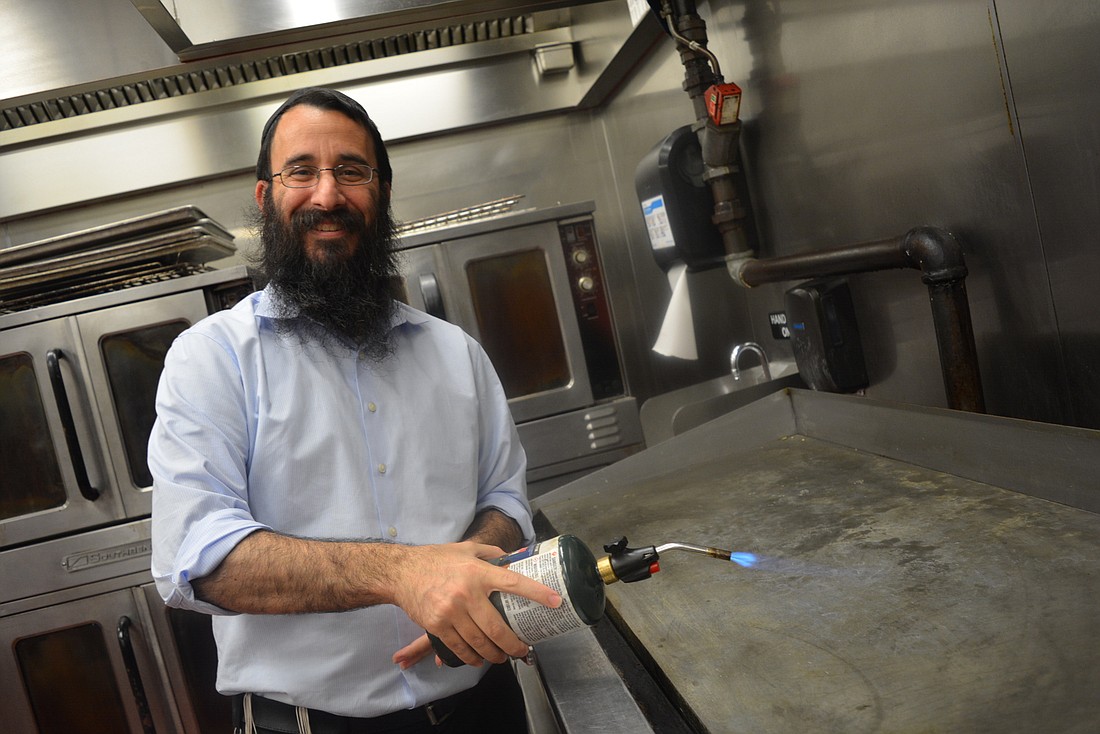- November 15, 2024
-
-
Loading

Loading

Rabbi Mendy Bukiet is ready to help the Jewish community welcome its new year, as well as gather for a time of introspection and repentance, as it celebrates the Rosh Hashanah and Yom Kippur holidays.
Part of that effort will be feeding an estimated 300 to 400 people who will attend Chabad of Bradenton and Lakewood Ranch’s High Holiday services Sept. 29 to Oct. 9 at Grove restaurant.
It’s not an easy task considering Grove must kosher its kitchen. Bukiet handles the details, but Grove still must make adjustments as it keeps its kitchen pure for the holidays while preparing food for other events it caters.
“It’s a complicated process,” Bukiet said, noting koshering a commercial kitchen could take anywhere from
one to five hours, depending on its size, cleanliness and if he has help from another rabbi. “It’s more being aware of what you are using. It has nothing to do with the blessing of a rabbi.”
In the Jewish community, kosher eating involves making sure you don’t eat dairy and meat at the same time. If you eat dairy, you must wait an hour before you can eat meat. If you eat meat, you must wait six hours to eat dairy.
Certain meats, such as pigs, bugs and many types of birds, are not kosher. Bukiet said products consumed cannot use nonkosher ingredients. For the event, food is ordered from a special vendor to ensure it is kosher, and new packages, such as for salt, are used.
Additionally, separate plates must be used for meat and dairy. For example, if you eat cheese on one plate, it must be koshered before it can be used for meat.
Those concepts make food preparations tricky. Bukiet said he tries to choose a menu for each service using either meat or dairy.
First, all items to be used in the kitchen must rest unused for 24 hours. After that, Bukiet comes in to clean items by removing all traces of food residue with one of three methods — boiling, blow torching or by chemicals, such as bleach.
Boiling is used for items including knives or even a food preparation table. Blow-torching is used on high-fire items, such as griddles, pots and ovens. Bukiet said he tries not to use chemicals, but they are sometimes required as a last resort for smaller items that cannot withstand the heat or in an emergency-type situation.
For Chabad’s High Holiday services, food will be offered after every service. For example, opening night for Rosh Hashanah will have a buffet with sushi, salads and other items, and the closing dinner for Yom Kippur will have bagels and lox.
Greg Campbell, director of operations and executive chef for Grove and its sister restaurant Pier 22, said the 24-hour wait on using items is the most difficult part of the process because Grove’s 11,000-square-foot kitchen is in constant use. Its catering prep kitchen is used for both Grove and Pier 22 events. Combined, they cater 10 to 20 events per day.
Campbell said Grove’s kitchen has multiple prep areas, which helps with keeping an area kosher for Chabad.
“It’s a little bit challenging, but everything we do is challenging,” Campbell said. “This is just a change in the process.
“We’re happy to be involved. It tests our employees. It tests our chefs. The more we can do these, the more systematic we become.”
Bukiet said he is grateful Grove is willing to accommodate Chabad’s koshering needs. The Polo Grill restaurant did before it closed, but the facilities have been the only restaurants large enough and willing to do so for Chabad events.
Last year, while Grove was under renovation prior to opening and not available during the holidays, Chabad hosted events on its Lorraine Road campus under a tent. Logistically, it was challenging and noisy, and Bukiet said he’s grateful to have a place to go to once again.
“To have this option again is a blessing for us,” he said. “The services are warm, welcoming, entertaining and uplifting. It’s really an opportunity for people to connect with their Jewish roots and to connect with God on this special day on the new year.”